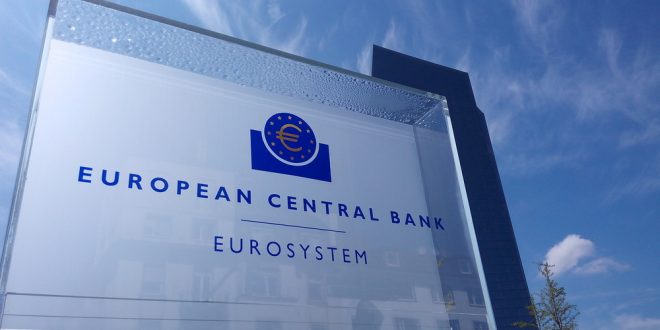The European Central Bank ‘ECB’ will announce its decision on monetary policy on Thursday, April 14, at 11:45 GMT. As we get closer to the release time, here are the expectations of the economists and forecasters of 6 major banks.
The European Central Bank is expected to leave key rates unchanged.
Inflation in Britain hit 7% in March on the back of soaring food and energy prices and is seen to advance to 9% as soon as next month, while inflation in Europe hit unusually high levels, with the German inflation reaching 7.6% in March.
The rising inflation will certainly lead to heated discussions at the heart of the European Central Bank’s committee at today’s policy meeting. The ECB plans to end the asset purchases by Q3 and hike the rates soon.
But the ECB doesn’t have the option to wait until the last quarter to hike rates; it must raise the interest rates by the end of summer, at the latest, even though inflation is caused by supply-side problems that can’t be effectively addressed with restricting demand.
The ECB’s Pandemic Emergency Purchase Program (PEPP) ended in March, even if covid still haunts the old continent. However, the Frankfurt-based institution still buys government bonds through its older Asset Purchase Program (APP), which is also set to decrease in the coming months gradually.
In March, ECB President Christine Lagarde refused to rule out an increase in borrowing costs this year. Signaling an initial move in June is hawkish, one in September is neutral. Officials may prefer a vaguer approach leaving the door open to moving “in coming months” and that would be hawkish.
Wells Fargo
“Despite a softer growth outlook, Eurozone headline inflation has moved sharply higher. Core inflation has also trended higher but to a lesser extent as it does not include volatile price components such as energy and food. But, even with core inflation slightly more modest, we still expect ECB policymakers to respond to elevated headline inflation. In that sense, we do not expect interest rate settings to change meaningfully but do expect ECB policymakers to taper asset purchases; however, we do now expect the ECB to lift interest rates 25 bps at the September 2022 meeting. We also expect steady interest rate hikes over the remainder of this year as well as into 2023.”
SocGen
“No major changes expected but a clear communication that all options are possible, depending on the data. ECB is likely to stress the importance of anchoring inflation expectations and sound more concerned about too high inflation than the downside risks to growth. New staff forecasts will not be available, and there is not a lot of new data since the March meeting. However, the ECB should acknowledge that the data in many cases have been better than what could have been expected, while inflation again has been higher than expected. Risks to inflation are still to the upside, while risks to growth are to the downside.”
Commerzbank
“Due to the unclear situation, there is unlikely to be any decisions at Thursday’s meeting, with one possible exception. The central bank could decide to increase the part of excess reserves that is exempt from interest at the prevailing deposit rate. Although we do not expect any decisions for Thursday’s meeting apart from the tiered interest rate, the discussion on the normalisation of monetary policy is likely to continue in the Council. However, it remains uncertain whether this current increasing willingness to raise interest rates will be followed by action later in the year. After all, the willingness of many Council members is based on the expectation that the economy will continue to grow steadily despite significantly higher energy prices. However, in the event of a complete boycott of Russian energy supplies, for example, a recession would probably be unavoidable.”
ING
“Staying put and continuing with the announced reduction of net asset purchases looks like the only viable option for now. However, given the latest market pricing of future ECB rate hikes and unclarity about the ECB’s exact reaction function in these times of high uncertainty, ECB President Christine Lagarde could be forced to somewhat limit the ECB’s optionality to a few options.”
TDS
“The ECB is likely to announce that its APP programme will end in May, and prepare markets for a June rate hike. An ECB pivot would anchor a possible low for EUR/USD, though a break of the 1.12 high requires settlement on the US terminal rate pricing. That said, a more active ECB is likely to reinforce the lows in EUR/CHF and would favor buying EUR/GBP dips towards 0.83.”
Nomura
“With no new forecasts to announce, few hard data to confirm the precise extent of the impact of the war on the euro area economy, and with there being another meeting before the end of Q2 at which the ECB could make its decisions on an APP wind-down, we do not believe the ECB needs to – nor will – announce any major adjustments to its guidance at its April meeting. This is, after all, the flexibility with regard the path of monetary policy that the ECB has craved. The focus instead, we believe, will be on any nuances that ECB President Lagarde reveals in the press conference following the decision. We expect the ECB to announce, at its June meeting, an end to its asset purchases in September with the first 25bp Deposit Rate hike coming in December this year. Thereafter, we expect a further three quarter-point rate hikes to +0.50% by end-2023 – a total tightening of 100bp. We expect a cessation of ECB tightening from the end of 2023, as at that point inflation could already be in retreat, and a slowing US economy could be leading the global economic cycle downwards once again.”
 Noor Trends News, Technical Analysis, Educational Tools and Recommendations
Noor Trends News, Technical Analysis, Educational Tools and Recommendations





